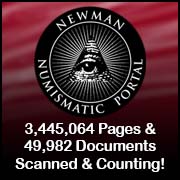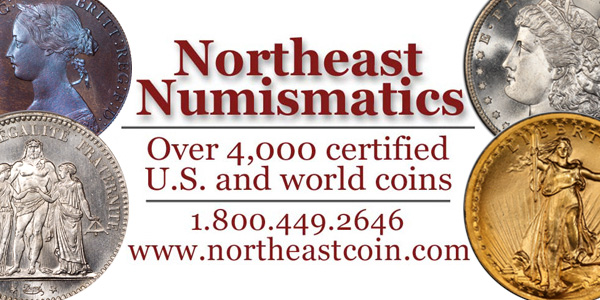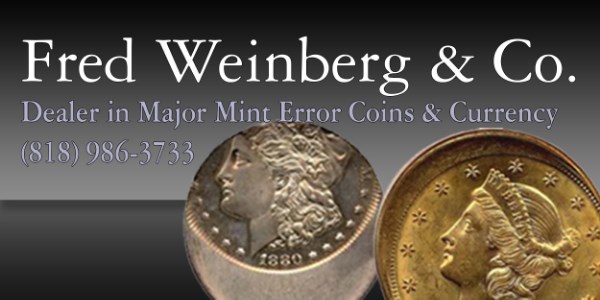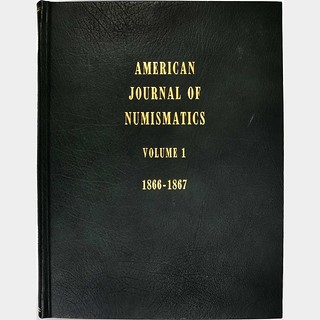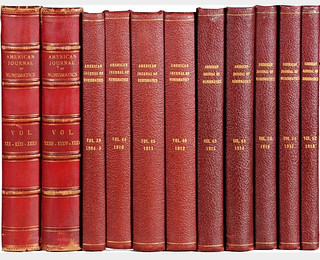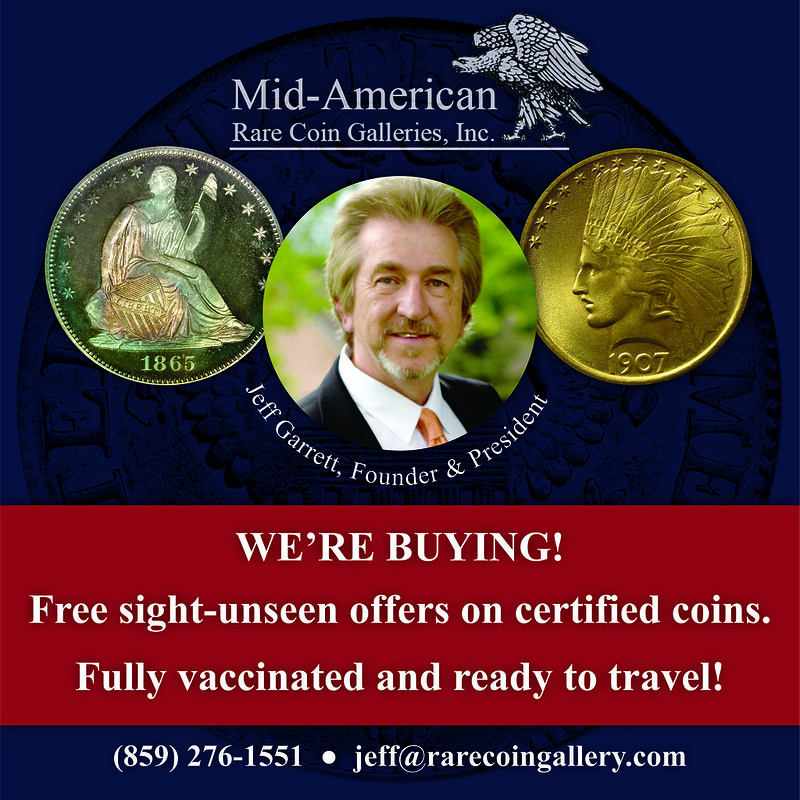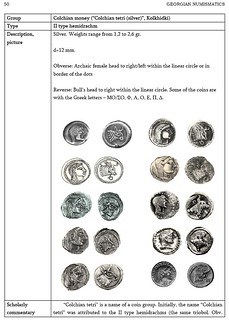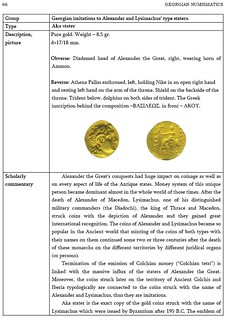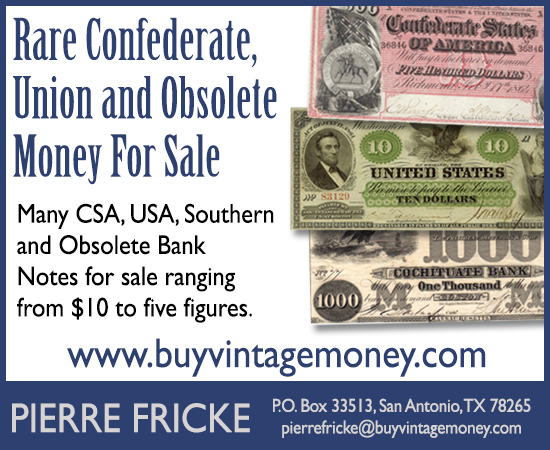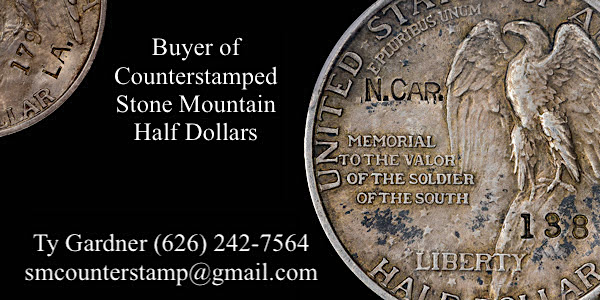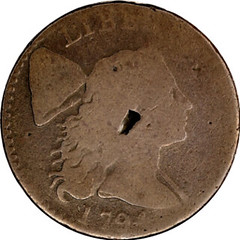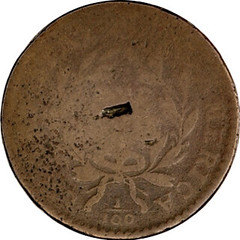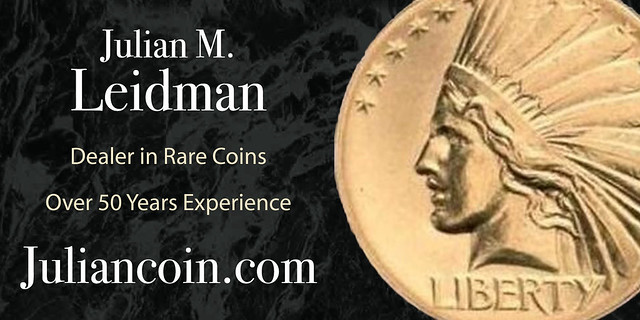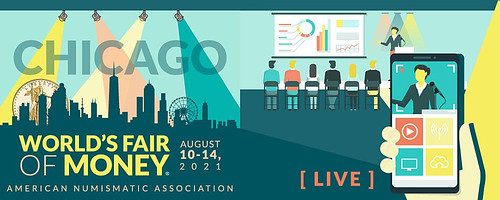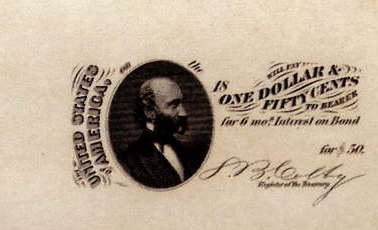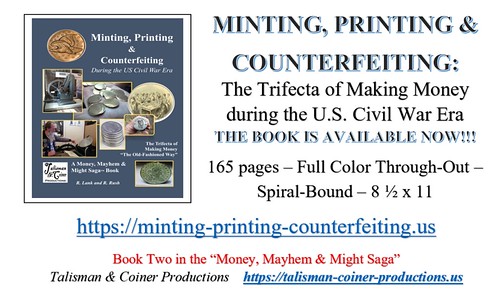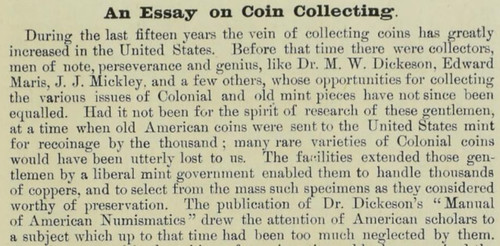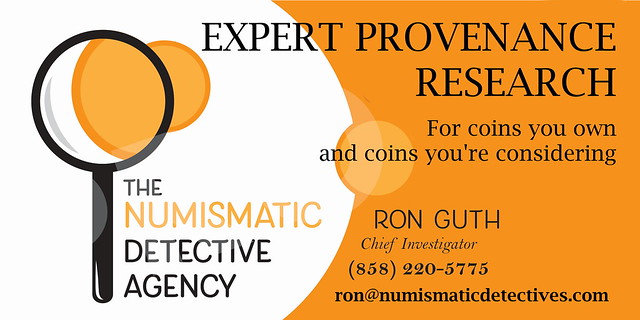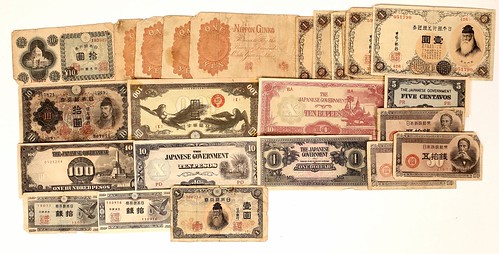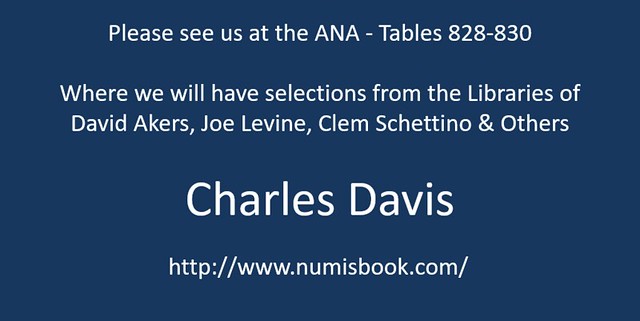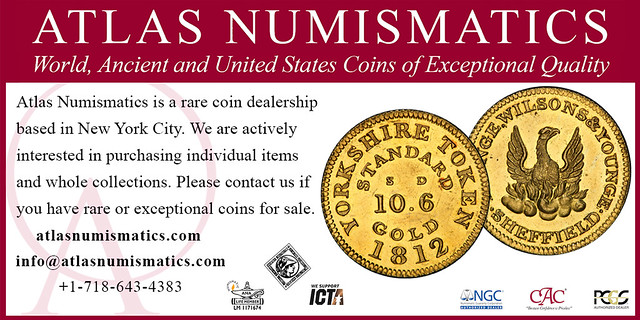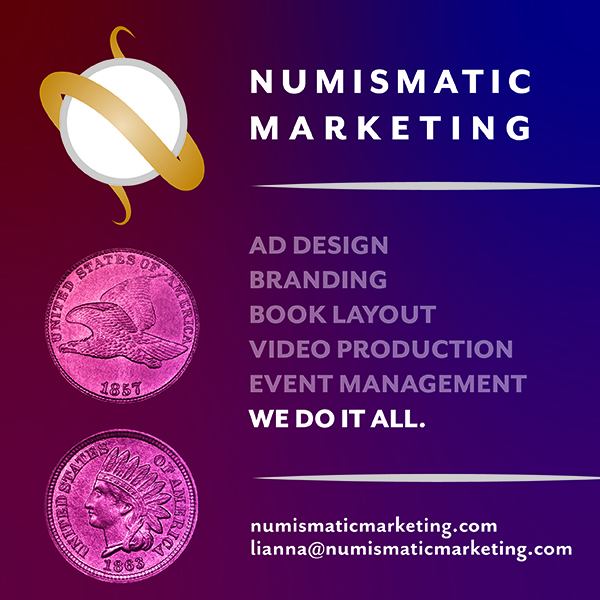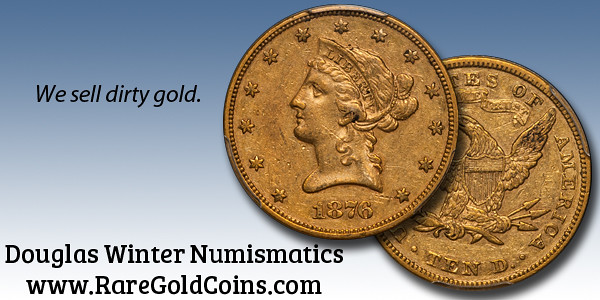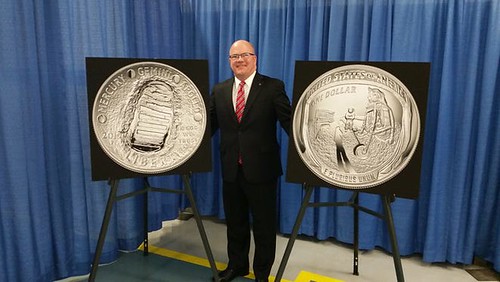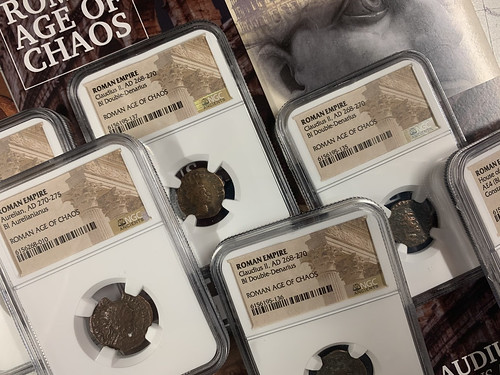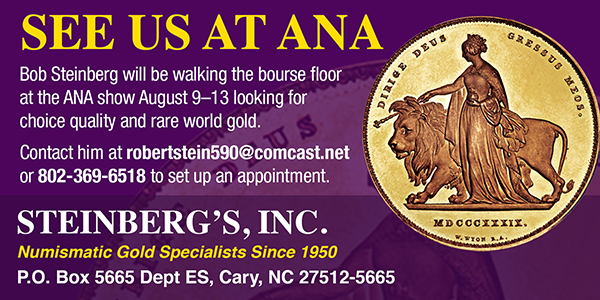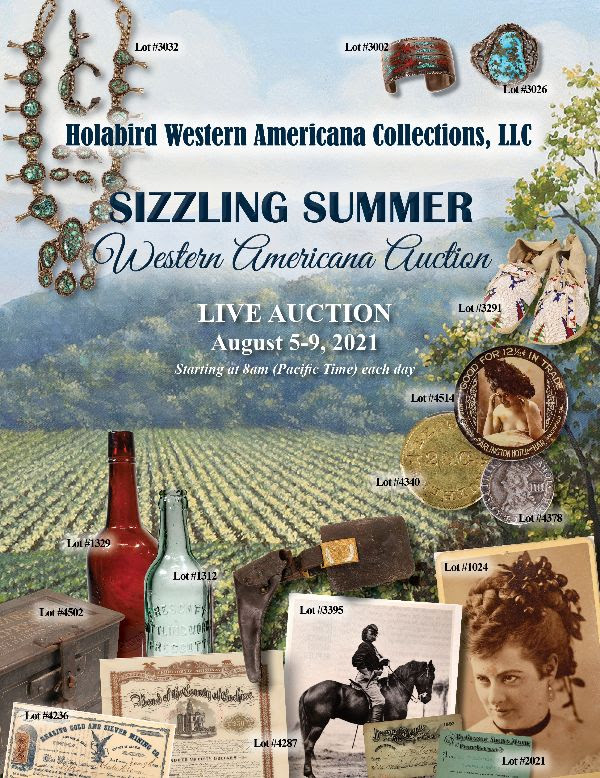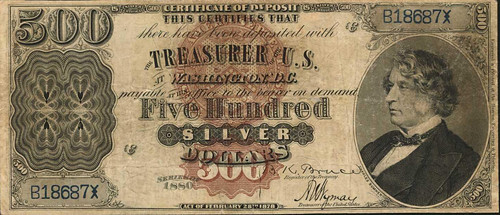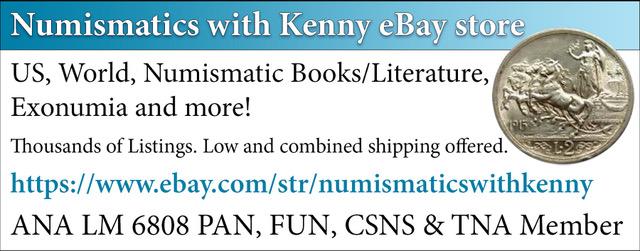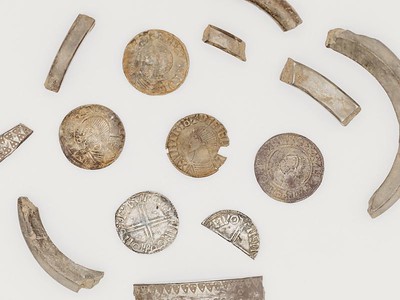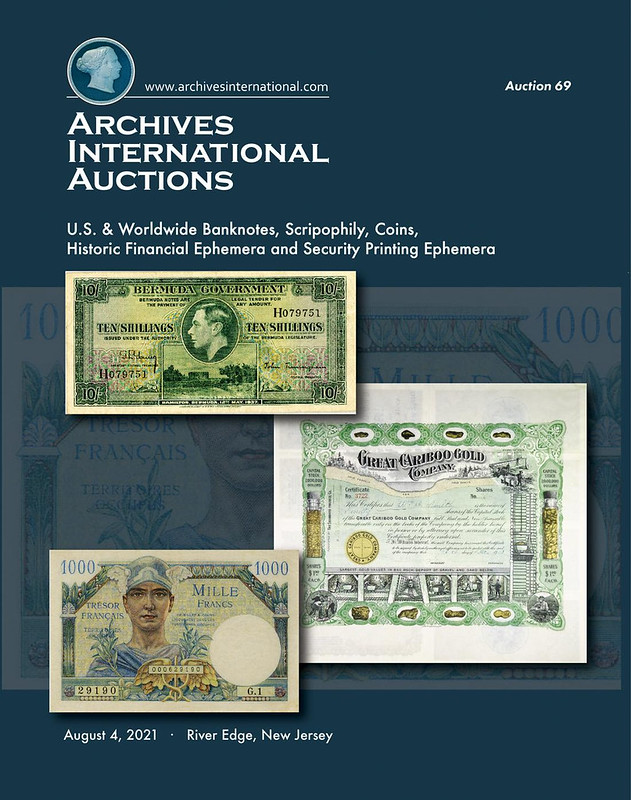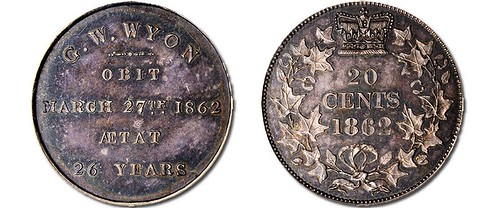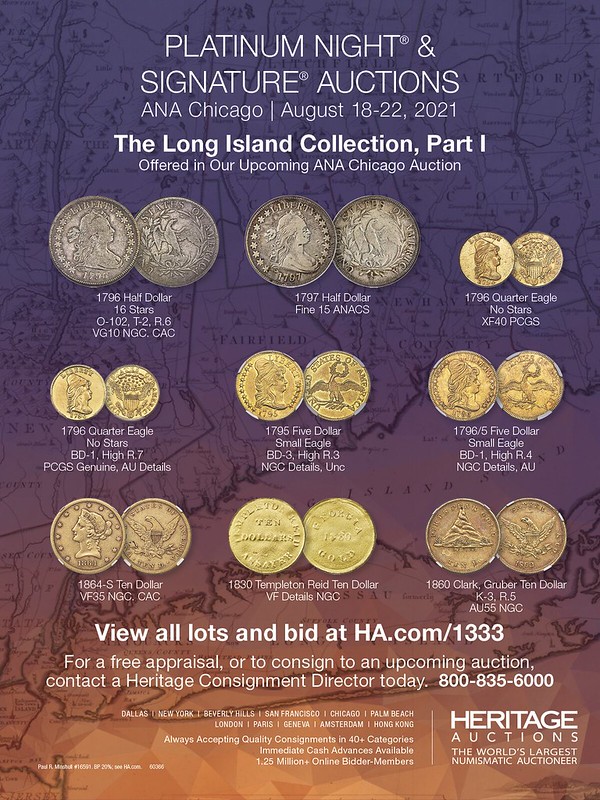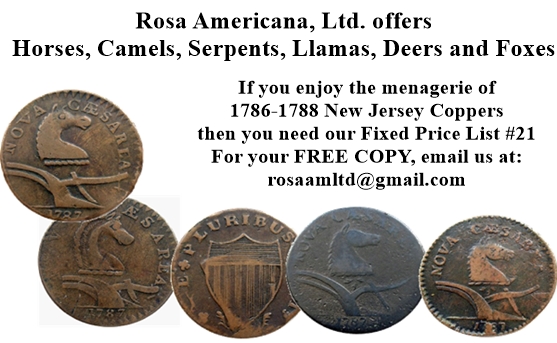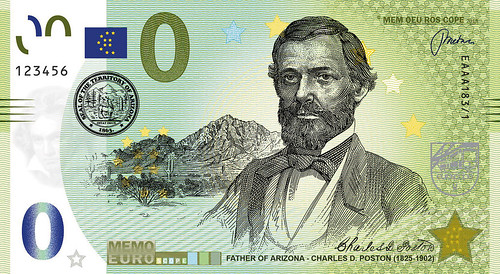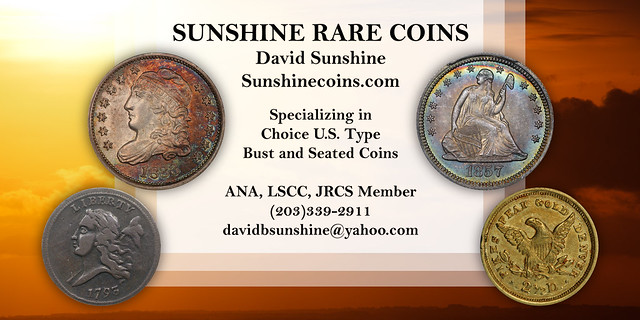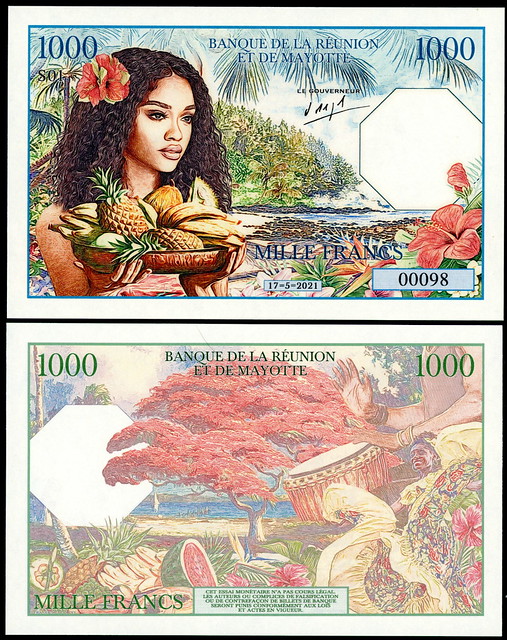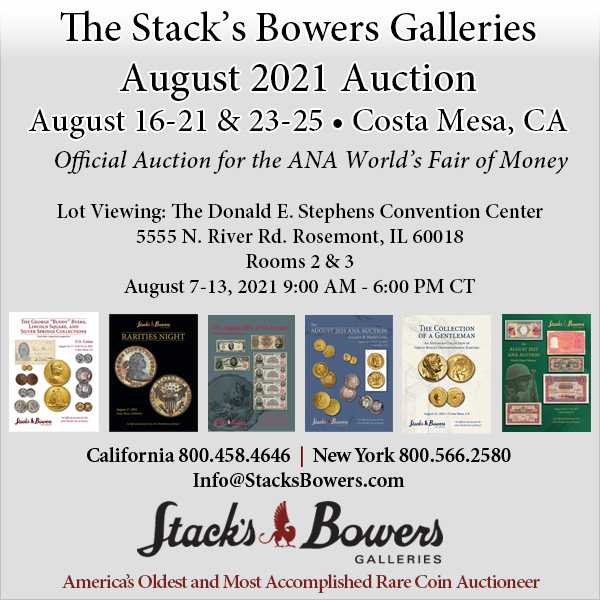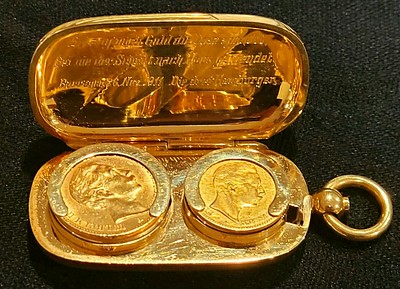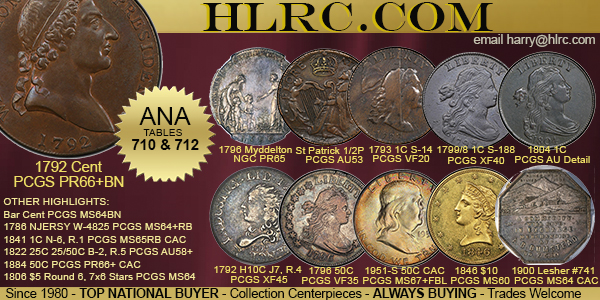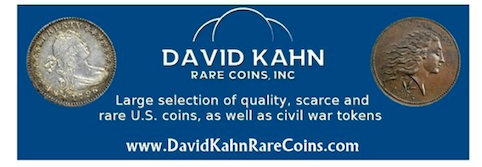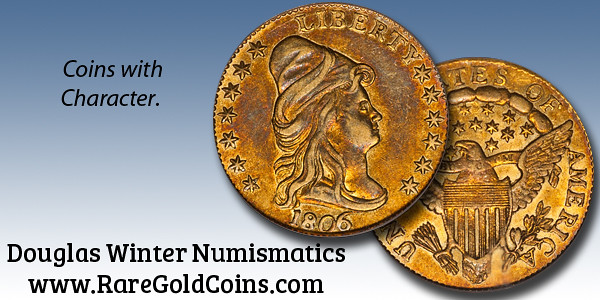
Visit our NBS Sponsors


About UsThe Numismatic Bibliomania Society is a non-profit association devoted to the study and enjoyment of numismatic literature. For more information please see our web site at coinbooks.org SubscriptionsThose wishing to become new E-Sylum subscribers (or wishing to Unsubscribe) can go to the following web page link MembershipThere is a membership application available on the web site Membership Application To join, print the application and return it with your check to the address printed on the application. Print/Digital membership is $40 to addresses in the U.S., and $60 elsewhere. A digital-only membership is available for $25. For those without web access, write to: Charles Heck, Treasurer AsylumFor Asylum mailing address changes and other membership questions, contact Chuck at this email address: treasurer@coinbooks.org SubmissionsTo submit items for publication in The E-Sylum, write to the Editor at this address: whomren@gmail.com BUY THE BOOK BEFORE THE COINSale CalendarWatch here for updates! |
- WAYNE'S WORDS: THE E-SYLUM JULY 25, 2021
- NBS BIBLIOTALK PODCAST WITH DAVID FANNING
- NBS EVENTS AT 2021 ANA WORLD'S FAIR OF MONEY
- STACKS BOWERS 2021 ANA SALE LITERATURE
- NEW BOOKS FROM DEMETRIUS SIATRAS
- NEW YORK CITY TRANSIT TOKEN WEBSITE RELEASED
- DOROTHY C. BABER (1920-2021)
- U.S. MINT'S 1895 'LEADING COIN DEALERS' LIST
- VIDEO: MEDALLIC WORKS OF CHARLES BARBER
- 2021 ANA WORLD'S FAIR OF MONEY LIVESTREAM
- S.B. COLBY IMAGE ON U.S. GOVERNMENT BONDS
- NOTES FROM E-SYLUM READERS: JULY 25, 2021
- JAPANESE MILITARY CERTIFICATES
- VOCABULARY TERM: FACE MILLED
- FIRST PLACE MEDAL AT THE 1896 OLYMPICS
- W.L. ORMSBY, PART TWO
- ARTICLE HIGHLIGHTS MICHAEL OLSON OF CCAC
- UNGRADED SLABBED ANCIENT COINS
- ARCHIVES INTERNATIONAL AUCTION 69
- STACK'S BOWERS 2021 ANA U.S. CURRENCY SALE
- WAYNE'S NUMISMATIC DIARY: JULY 25, 2021
- VIKING COIN FIND ON THE ISLE OF MAN
- MEDALLIC MEMENTO OF GEORGE WILLIAM WYON
- PHILIPPINES CONSIDERS TACTILE BANKNOTES
- ARIZONA ROTARY ISSUES COMMEMORATIVE NOTE
- FANTASY FRENCH-STYLE ISLAND BANKNOTE
- GOLD COIN CARRYING CASE
- CHINA'S BIG MEXICAN COIN SCULPTURE
- AMERICAN EAGLE BULLION COIN KEY FEATURES
- LOOSE CHANGE: JULY 25, 2021
Click here to read the thin version on the web
Click here to subscribe
Click here to access the complete archive
To comment or submit articles, reply to whomren@gmail.com
Content presented in The E-Sylum is not necessarily researched or independently fact-checked, and views expressed do not necessarily represent those of the Numismatic Bibliomania Society.
WAYNE'S WORDS: THE E-SYLUM JULY 25, 2021
 New subscribers this week include:
Hawk Levy, courtesy John and Nancy Wilson; and
Kevin White. Welcome aboard! We now have 6,681 subscribers.
New subscribers this week include:
Hawk Levy, courtesy John and Nancy Wilson; and
Kevin White. Welcome aboard! We now have 6,681 subscribers.
Thank you for reading The E-Sylum. If you enjoy it, please send me the email addresses of friends you think may enjoy it as well and I'll send them a subscription. Contact me at whomren@gmail.com anytime regarding your subscription, or questions, comments or suggestions about our content.
This week we open with NBS events at the ANA convention, numismatic literature in the Stack's Bowers ANA sales, three new books and a new website, updates from the Newman Numismatic Portal, notes from readers and more.
Other topics this week include the medallic works of Charles Barber, Japanese Military Certificates, medals of the 1896 Olympics, Mike Olson, upcoming auction highlights, tactile banknotes, fantasy banknotes, and a Mexican coin sculpture in China.
To learn more about numismatic bibliographies, Attinelli's Numisgraphics, Hall's Connecticut Coppers, Newlin's Early Half Dimes, Georgian numismatics, New York City transit tokens, leading coin dealers of 1895, coins that stopped a bullet, W.L. Ormsby, ungraded slabbed coins, the American Colonization Society, and a Viking "piggy bank". read on. Have a great week, everyone!
Wayne Homren
Editor, The E-Sylum
NBS BIBLIOTALK PODCAST WITH DAVID FANNING
The latest episode of the Numismatic Bibliomania Society podcast is now available for listening. It's on the NBS web site but also available elsewhere. Vice-President/Secretary Len Augsburger provided this report. -Editor
NBS PodcastNumismatic Bibliographies, with David Fanning
Posted
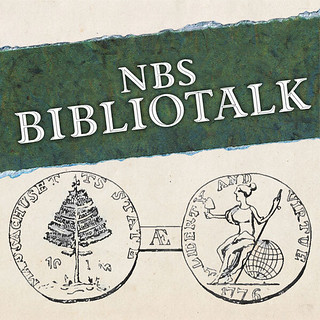 The latest episode of the NBS Bibliotalk podcast,
The latest episode of the NBS Bibliotalk podcast,Numismatic Bibliographies, with David Fanning
is now available on the NBS website and other popular podcasting platforms such as Buzzsprout. In this installment, Lianna Spurrier, Bibliotalk producer, interviews David Fanning of Kolbe & Fanning, Numismatic Booksellers. The numismatic bibliography has a rich history, with the first such compilation published in the 16th century. Fanning covers the history of the numismatic bibliography to the present day, and discusses the strengths and weaknesses of a number of emissions along the way. Collectors invariably need lists of things to collect, and the numismatic bibliography does double duty, serving as both a scholarly resource and as a collector's checklist. Tune in for this in-depth look at the bibliophile's indispensable companion.
NBS EVENTS AT 2021 ANA WORLD'S FAIR OF MONEY
This seems like a good time to remind readers of club events at the upcoming ANA convention. Here's an update of NBS President Tom Harrison's message from earlier this month. I hope to see many of you there! -Editor
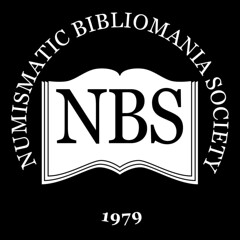 We are excited to once again be attending the ANA World's Fair of Money in person. The Numismatic Bibliomania Society will be hosting club table #724 from Tuesday - Friday. We will be displaying some of the highlights from our all important charity auction that will be held during the General Meeting on Friday. We will also be offering NBS coffee mugs for a $25 donation to the NBS. Please stop by to say hi and share your thoughts about the NBS.
We are excited to once again be attending the ANA World's Fair of Money in person. The Numismatic Bibliomania Society will be hosting club table #724 from Tuesday - Friday. We will be displaying some of the highlights from our all important charity auction that will be held during the General Meeting on Friday. We will also be offering NBS coffee mugs for a $25 donation to the NBS. Please stop by to say hi and share your thoughts about the NBS.
The NBS will be holding our Symposium on Thursday the 12th at 1:00 PM in room 24. The Symposium will feature a presentation by Rusty Goe who is a recognized authority on the history of the Carson City Mint and its coinage. The title of his presentation is Studying the Carson City Mint and its' Coins.
The Board meeting will be held earlier that day (Thursday the 12th) at 11:30, also in room 7.
The General Meeting will be held on Friday the 13th at 11:30 AM, again in room 7. The meeting will include the announcement of the awards for the best articles in our print journal, The Asylum and a presentation by NBS Vice President, Len Augsburger discussing the digitalization of Coin World and Numismatic News. Another highlight will be the charity auction that always provides a fascinating variety of literature. The auction is our one annual fund-raiser, so we hope you will join us to help support the mission of the NBS. Looking forward to gathering in Rosemont.
STACKS BOWERS 2021 ANA SALE LITERATURE
There is a small but choice offering of American Numismatic Literature in the upcoming Stack's Bowers sale. Here are some selections - see lot 5214 - 5235 online. -Editor
Lot 5215: American Journal of Numismatics Volume 1
American Numismatic & Archaeological Society. American Journal of Numismatics. Volume One, No's 1-12, complete. May 1866 to April 1867. Fine.
12.25 inches x 9.5 inches. Hardbound as one in full dark green leather. Lettered in gilt on the front cover, with gilt double ruled ornaments at the head and foot of the spine. Original green paper covers are bound in for the first ten of the dozen issues included, that of the first number having been professionally backed for support. Minor chipping and handling along many page edges, but intact and remarkably clean otherwise. The bookplate of Armand Champa is laid in.
This volume represents the beginnings of the shared published scholarship of all matters numismatic in the United States. The American Journal of Numismatics continues to this day in a second series, and the entirety of what has been published since 1866 is filled with original research, much of which remains relevant source material.
An article by Frank Van Zandt in the Fall 1993 edition of The Asylum, noted that this large paper format was not generally known to the membership at the time of publication, and not brought to light until it was referenced in a letter by collector J. Carson Brevoort, who had received a large format from Frank H. Norton, director of the A.N.S. from 1864 to 1867. He had written to the secretary of the Journal asking for future volumes in this size. The reply was that they could no longer be produced.
To read the complete lot description, see:
American Numismatic & Archaeological Society. American Journal of Numismatics. Volume One, No's 1-12, complete. May 1866 to April 1867. ...
(https://auctions.stacksbowers.com/lots/view/3-S6H7Q/american-numismatic-archaeological-society-american-journal-of-numismatics-volume-one-nos-1-12-complete-may-1866-to-april-1867-)
Lot 5216: American Journal of Numismatics Set
American Numismatic & Archaeological Society. American Journal of Numismatics. Volumes 1-35, 39, 44-46, 48-52. May 1866 to 1918. Fine to Very Fine.
Sizes vary, ranging from 11.35 inches x 7.5 inches to 11 inches x 8.25 inches. The early volumes, no's 1 to 35, are bound into 12, in half red morocco with marbled boards. Double ruled gilt ornaments line the borders of the leather. Five raised spine bands, with compartments two and six lettered in gilt. Various pastedowns and flyleaves among the volumes, some of which have had restorations of varying styles. Still, the bindings are respectably tight, and the interiors are quite clean. A well-used run clearly owned by a studious numismatist, the bookplate of George Merryweather inside each front cover. The later volumes, dated between 1904 and 1918, are hardbound mostly by year, in full maroon cloth with a simulated leather finish. Lettered in gilt on the spine. These volumes are generally Very Fine.
Though incomplete, this set includes important content from the early years of the Journal. Volume 3 in particular is most desired for its inclusion of the 1854 photograph of the first United States Mint, the famous Levick Plate of 1793 large cents, and Sylvester S. Crosby's systematic discussion of same - a foreshadowing of what he would soon accomplish in much grander form with his publishing of The Early Coins of America in 1875. The images of the Mint and the Levick plate in the presently offered volume are clear and in superb condition. Even a brief survey of the early articles yields entries of interest and fascination.
To read the complete lot description, see:
American Numismatic & Archaeological Society. American Journal of Numismatics. Volumes 1-35, 39, 44-46, 48-52. May 1866 to 1918. Fine to...
(https://auctions.stacksbowers.com/lots/view/3-S6H7V/american-numismatic-archaeological-society-american-journal-of-numismatics-volumes-1-35-39-44-46-48-52-may-1866-to-1918-fine-to)
NEW BOOKS FROM DEMETRIUS SIATRAS
Demetrius Siatras of Athens, Greece writes: "After months of inactivity because of the pandemic, we are back presenting some recent titles." -Editor
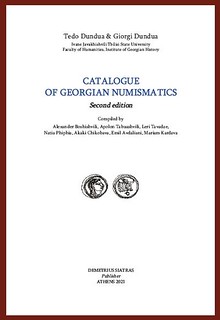 T. Dundua & G. Dundua
T. Dundua & G. Dundua
Catalogue of Georgian Numismatics
Athens, 2021. In English. Soft cover, 29 cm, 400 pp., ill.; net weight 1600 gr. ISBN: 978-618-84558-1-8, EUR 96.- Illustrated catalogue of all the coins struck in the region of Georgia up to the 30's of the 19th century, including Greek, Roman, Byzantine, and Ottoman coins.
NEW YORK CITY TRANSIT TOKEN WEBSITE RELEASED
Here's the press release for a new website cataloging New York City transit tokens and related tickets and ephemera. -Editor
Web catalog and price guide for NYC Tickets, Tokens, Transfers and Passes
The Catalog of fiscal Ephemera & Exonumia from Transit Companies of the City of New York has been released.
Developed by Philip Goldstein with the assistance of George Cuhaj, both life-long enthusiasts, the site is divided into twelve chapters which highlight the various fare payment systems starting with the 1830s introduction of horsecars and omnibuses, elevated railways, subways and busses up to the introduction of the MetroCard.
DOROTHY C. BABER (1920-2021)
Hobby stalwart Dorothy Baber has passed away at the age of 101. This obituary was published online just today. -Editor
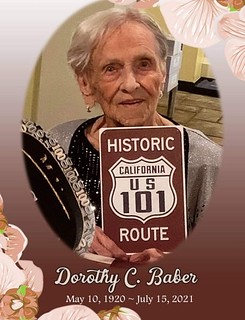 101 years and 66 days and she was gone. Dorothy C. Baber died peacefully at her home of 63 years in El Cajon with family and friends around her on Thursday, July 15, 2021. Dorothy was born May 10,1920 in Junction City, Kansas to Berniece Pelsma and George W. Carson. She was the first of three children being joined by siblings Berniece (Scott) and Ralph, both of whom predeceased her.
101 years and 66 days and she was gone. Dorothy C. Baber died peacefully at her home of 63 years in El Cajon with family and friends around her on Thursday, July 15, 2021. Dorothy was born May 10,1920 in Junction City, Kansas to Berniece Pelsma and George W. Carson. She was the first of three children being joined by siblings Berniece (Scott) and Ralph, both of whom predeceased her.
Dorothy lived her childhood and youth in Kansas before migrating with husband Al Baber and toddler daughter Jean to California in 1941. During WWII Al was serving in the South Pacific and Dorothy was like many other wives keeping the home and raising their three children, including son Larry and daughter Vicki. Dorothy lived in San Diego until 1958 when she moved to her current home El Cajon. Dorothy was at the vanguard of women when she entered the workforce full time in 1950 working at Consolidated Aircraft, which became Convair then General Dynamics. She continued working spending the last 14 years of her career working as a court room clerk for the County of San Diego Municipal Court in El Cajon.
U.S. MINT'S 1895 'LEADING COIN DEALERS' LIST
Newman Numismatic Portal intern Garrett Ziss provided the following article based on recently added digital content. Thanks! -Editor
Last week's NNP E-Sylum article highlighted the business relationships the United States Mint had with coin dealers during the late 19th and early 20th centuries. According to National Archive correspondence, the Mint released a list ofleading coin dealers
in 1895. Not only did these dealers provide numismatic items for their clients, but at least three of them also advanced the study of numismatics: Charles Steigerwalt, Lyman Low and John Colvin Randall.
THE BOOK BAZARRE
VIDEO: MEDALLIC WORKS OF CHARLES BARBER
These are selections from the David Lisot Video Library that feature news and personalities from the world of coin collecting. David has been attending coin conventions since 1972 and began videotaping in 1985. The Newman Numismatic Portal now lists all David's videos on their website at:
https://nnp.wustl.edu/library/multimediadetail/522852
Here's one on the medallic works of Charles Barber. -Editor
Medallic Works of Charles Barber
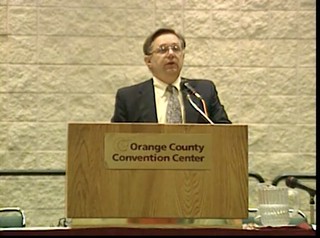 Presented at the Florida United Numismatists in 1996. Charles Barber designed some of America's most famous coins. Learn about other numismatic works that helped insure this great sculptor's place in history. Lecture with slides.
Presented at the Florida United Numismatists in 1996. Charles Barber designed some of America's most famous coins. Learn about other numismatic works that helped insure this great sculptor's place in history. Lecture with slides.
Speaker(s): Lawrence P. Baber.
The video is available for viewing on NNP at:
https://nnp.wustl.edu/library/book/560344
2021 ANA WORLD'S FAIR OF MONEY LIVESTREAM
The American Numismatic Association will be offering certain events at next month's convention via Facebook livestreaming. -Editor
The ANA will be livestreaming select activities and events during the convention to the ANA's Facebook page (facebook.com/numismatics). The schedule for livestreamed events is as follows:
S.B. COLBY IMAGE ON U.S. GOVERNMENT BONDS
Recently Jerry Fochtman asked about the image of Registrar S.B. Colby on a U.S. government bond. Chris Steenerson supplied this response. -Editor
That type of portrait coupon was used on the Consolidated Five-Twenty Coupon Bonds of 1864.
NOTES FROM E-SYLUM READERS: JULY 25, 2021
Frossard's Essay on Coin CollectingBill Eckberg writes:
"The late 1800s were by no means the first time the Mint gave special access to certain coin dealers. A largely forgotten piece by Édouard Frossard, writing in 1876 tells the story. (Frossard, Édouard. 1876. An essay on coin collecting. The Coin Collector's Journal p.193.)
"During the last fifteen years the vein of collecting coins has greatly increased in the United States. Before that time there were collectors, men of note, perseverance and genius, like Dr. M. W. Dickeson, Edward Maris, J. J. Mickley, and a few others, whose opportunities for collecting the various issues of Colonial and old mint pieces have not since been equalled. Had it not been for the spirit of research of these gentlemen, at a time when old American coins were sent to the United States mint for recoinage by the thousand, many rare varieties of Colonial coins would have been utterly lost to us. The facilities extended those gentlemen by a liberal mint government enabled them to handle thousands of coppers, and to select from the mass such specimens as they considered worthy of preservation."
"Perhaps we can criticize theliberal mint government" for this preferential treatment, but if it hadn't been done, 18th century cents, half cents and colonials would probably be rare enough as to be difficult or impossible to collect."
Quite true. Thanks. -Editor
To read the issue on the Newman Numismatic Portal, see:
Coin Collector's Journal, vol. 1
(https://nnp.wustl.edu/library/book/512344)
To read the earlier E-Sylum article, see:
COIN DEALERS AND THE UNITED STATES MINT
(https://www.coinbooks.org/v24/esylum_v24n29a06.html)
Other topics this week include numismatic website name origin stories, coins that stopped a bullet, and examining precious documents. -Editor
JAPANESE MILITARY CERTIFICATES
Howard Daniel submitted this note in response to an auction lot discussed in last week's issue. Thanks. -Editor
The item; Japanese Currency and Invasion Money, in your last E-Sylum, was of interest to me because it includes at least one piece in the lot in the upcoming Holabird America sale that was issued in Burma during World War II. I am now working on the 1st edition of my Myanmar (Burma) Coins & Currency catalog and there is a chapter in it covering the issues of WWII.
VOCABULARY TERM: FACE MILLED
Here's another entry from Dick Johnson's Encyclopedia of Coin and Medal Terminology. I added some Love Token images. -Editor
Face Milled. A smoothed or flattened surface, milled or planed or ground off; said of a medallic or numismatic item in which one or both sides have been smoothed off to be engraved with a new design and/or lettering. Usually it is the reverse which is face milled with the obverse of the coin or medal left intact. All love tokens are so smoothed before they are engraved. It is easiest to remove all relief, including the border, until an absolutely flat surface is obtained across the full flan – it is also possible to face mill both sides, in a sense to make a blank from a struck piece. In rare instances only the relief is ground off one side leaving the raised border intact. Face milling is also done for some hand punched items, very infrequently for counterstamping.
FIRST PLACE MEDAL AT THE 1896 OLYMPICS
Last week Pete Smith proposed giving an E-Sylum Smarty-Pants Award to the first correct response to this question: Who won the first gold medal at the 1896 Athens Olympics? -Editor
Michael Kodysz writes:
From a Google search: "On 6 April 1896, the American James Connolly won the triple jump to become the first Olympic champion in more than 1,500 years."
Bob Steinberg came up with that answer, too. -Editor
Bruce Bartelt writes:
"The first 1896 Olympic gold medal was won by Robert Garrett, son of T. Harrison Garrett."
W.L. ORMSBY, PART TWO
Susan Bremer of Heritage published the second of a series of articles about engraver, author and publisher W.L. Ormsby. It appeared in the July 22, 2021 issue of the Heritage Currency News email. -Editor
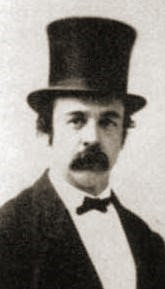 Part II of W. L. Ormsby's story is one of creative and mechanical achievements. Although most well known as a banknote engraver with a questionable reputation, W.L. Ormsby was a prolific inventor with twenty-four inventions to his credit. His inventions were all based on his fixation with anti-counterfeiting measures for currency.
Part II of W. L. Ormsby's story is one of creative and mechanical achievements. Although most well known as a banknote engraver with a questionable reputation, W.L. Ormsby was a prolific inventor with twenty-four inventions to his credit. His inventions were all based on his fixation with anti-counterfeiting measures for currency.
Ormsby invented a machine called a grammagraph. The grammagraph machine is used to copy medals, medallions and scenes onto banknote dies to give the illusion of bas relief, a method wherein the depth of the engraving from the side does not reveal the subject but looking at the item from the front gives the complete picture. Bas relief is most commonly used on coins. The grammagraph was eventually used as a pantographic engraving machine, which produces roll-die engraving on metal. In conjunction with Samuel Colt of Colt Firearms, this method was used on the cylinders of the Colt Walker pistol as well as several others. Ormsby contributed a half dozen engravings which were used on the cylinders of the pistols, including Rangers and Indians, the Second Texas Navy and Battle of Compeche, and Stagecoach Hold-up. Originally, intended as a method of counterfeit deterrence, this invention opened another avenue to success for Ormsby.
ARTICLE HIGHLIGHTS MICHAEL OLSON OF CCAC
With this week's anniversary of the 1969 Apollo moon landing, the Des Moines Register published an article about Michael Olson and his work on the U.S. Mint's Citizens Coinage Advisory Committee leading to the Apollo 11 50th Anniversary commemorative coin. Here's an excerpt - see the complete article online. -Editor
A Pella man has been recognized for pioneering efforts to see Congress authorize an Apollo 11 50th Anniversary commemorative coin.
Michael Olson was awarded the U.S. Mint Director's Award earlier this year for proposing the mints issue the coins in honor of the 50th anniversary of the moon landing after the Apollo 11 mission launched July 16, 1969, landed the Apollo Lunar Module on July 20, 1969, and returned to Earth on July 24, 1969.
The coin was issued in 2019 and has won several accolades, including the prestigious 2021 Coin of the Year award.
UNGRADED SLABBED ANCIENT COINS
Earlier this year we published an excerpt from a PAN Clarion interview with Lianna Spurrier, where she was asked for ideas about making coin collecting more attractive to young people. I liked her concept of making entry-level coins "a bit more glamorous" with nicer holders and labels. Robin Danziger of wholesale supplier Educational Coin Company published this note in an email earlier today promoting a product along similar lines - ungraded ancient coins in NGC slabs. -Editor
By far the biggest surprise we have discovered over the last three years is the untapped demand for affordable roman coins in ungraded NGC holders for beginning collectors.
Only a very few of our partners have caught on to this secret. But those few have collectively sold tens of thousands of them so far. We watch their sales and continue to be astonished. They have found it is a great way to introduce ancients to would-be collectors that eventually learn more, became more serious and soon become buyers of bigger ticket ancients from them.
ARCHIVES INTERNATIONAL AUCTION 69
Here is the announcement for the August 4, 2021 sale by Archives International Auctions. -Editor
ARCHIVES INTERNATIONAL AUCTIONS OFFERS HISTORIC U.S. & WORLD BANKNOTES, SCRIPOPHILY AND HISTORIC EPHEMERA ON AUGUST 4th , 2021 IN RIVER EDGE, NEW JERSEY, U.S.A.
The auction will be held by Archives International Auctions at their offices in River Edge, N.J.
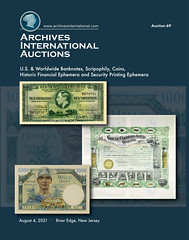 The August 4th, 2021 auction by Archives International Auctions is
highlighted by hundreds of rare and desirable banknotes rarely seen at auction. The Auction 69 catalog will consist of over 900 lots of rare and desirable U.S. & World Banknotes, Scripophily, Coins, Historic Financial Ephemera and Security Printing Ephemera.
The August 4th, 2021 auction by Archives International Auctions is
highlighted by hundreds of rare and desirable banknotes rarely seen at auction. The Auction 69 catalog will consist of over 900 lots of rare and desirable U.S. & World Banknotes, Scripophily, Coins, Historic Financial Ephemera and Security Printing Ephemera.
“We are striving to offer our clients and friends items of historical and collecting interest that have been off the market for decades or are new to the collecting world, stated Dr. Robert Schwartz, President of Archives International Auctions.Included in the upcoming auction is a wide variety of rare, interesting and desirable numismatic and historical objects curated to enhance the collections of every level of collector and dealer
.
STACK'S BOWERS 2021 ANA U.S. CURRENCY SALE
Here's the press release for the upcoming Stack's Bowers U.S. Currency Auction. Nice material here, too! -Editor
Stack's Bowers Galleries is proud to announce their Official U.S. Currency Auction for the ANA World's Fair of Money, hosted from Griffin Studios, their state-of-the-art auction venue in Costa Mesa, California. The August sale represents the firm's first Showcase Auction of U.S. Currency since their record-setting sale in March, and collectors are sure to greet this summer event with tremendous enthusiasm.
The standout highlight of the sale is a Fr. 345d 1880 $500 Silver Certificate graded PMG Fine 15, which is the only privately available example of the catalog number and has been off the market since its last public auction sale in 2006. This treasure is offered alongside an array of sophisticated collections that include some of the greatest rarities of the Friedberg reference.
WAYNE'S NUMISMATIC DIARY: JULY 25, 2021
Tuesday, July 20, 2021 was not only the anniversary of the first moon landing, it was the night of the latest dinner meeting of my Northern Virginia numismatic social group, Nummis Nova. Mike Packard was our host at a familiar location - The Epositos Restaurant, a nice little Italian place in Fairfax, VA.
I arrived early to spot Tom Kays entering the restaurant. My phone rang and I learned my guest had arrived, too. Elsewhere in the parking lot was CoinWeek editor Charles Morgan. We chatted for a bit and went inside to find Tom and Dave Schenkman already seated at our table. Before long there were ten of us in all - me, Charles, Tom, Dave, Mike, Eric Schena, Jon Radel, Steve Bishop, Julian Leidman and Roger Burdette.
THE BOOK BAZARRE
VIKING COIN FIND ON THE ISLE OF MAN
Larry Korchnak passed along this Smithsonian article about a recent Viking find on the Isle of Man. Thanks. -Editor
In April, retired police officer and metal detecting enthusiast Kath Giles unearthed a Viking-era "piggy bank" filled with 1,000-year-old silver coins, jewelry and other artifacts on Isle of Man, a British dependency located off the northwest coast of England.
The find is Giles' fourth discovery since picking up metal-detecting as a hobby three years ago. She recently made news this February when she unearthed another trove of gold and silver Viking age jewelry.
MEDALLIC MEMENTO OF GEORGE WILLIAM WYON
Stack's Bowers Senior Numismatist and Cataloger Jeremy Bostwick published a blog article about a fascinating item in the firm's upcoming sale. Wow! -Editor
Our upcoming Official Auction of the ANA World's Fair of Money will see numerous highlights cross the auction block, including many exciting rarities that seldom present themselves. A perfect example of this is a type last offered as a part of our Frontenac Sale (Bowers and Merena, November 1991). Featuring the normal design for the current (at the time) New Brunswick 20 Cents on the reverse, an incredibly rare obituary "pattern" utilizes a special, rather moving obverse commemorating the life of an engraver who passed away at a far too early age (lot 40099). Reading "G. W. WYON / OBIT / MARCH 27th 1862 / ÆTAT / 26 YEARS" in five lines, this piece poses an intriguing question: why would an issue seemingly commemorative in nature exhibit an ordinary coin type reverse?
PHILIPPINES CONSIDERS TACTILE BANKNOTES
The Central Bank of the Philippines is considering adding tactile features to its banknotes. -Editor
 The Bangko Sentral ng Pilipinas (BSP) is exploring the addition of braille functionality to Philippine banknotes.
The Bangko Sentral ng Pilipinas (BSP) is exploring the addition of braille functionality to Philippine banknotes.
The BSP said in a statement on Thursday, July 22, that the introduction of braille in the Philippine currency will benefit as many as 2.5 million visually impaired Filipinos.
Last July 2020, the BSP introduced enhanced tactile marks in bills to aid persons with disabilities (PWDs) in identifying denominations.
ARIZONA ROTARY ISSUES COMMEMORATIVE NOTE
"Zero Euro" notes have become popular fund-raising and awareness-raising items in recent years, but I was not aware of them reaching U.S. soil. Here's an article about a commemorative note produced for an Arizona Rotary chapter. These are nicely done. -Editor
Arizona's founder and first House of Representatives, Delegate Charles D. Poston (1825-1902), would certainly raise his eyes in disbelief to have his portrait used on a banknote 119 years after his death. In his life, Poston already mentioned plans to produce an Arizona banknote. With this Charles D. Poston Banknote, through the initiative of Rotary Scottsdale's former president Richard Signeski, it now is a reality. The Scottsdale Rotary Club, in collaboration with MemoEuro.world, issues this limited edition Charles D. Poston commemorative banknote as a charity fundraiser. The banknote is a collectible and charity fundraiser, it is not a legal tender.
FANTASY FRENCH-STYLE ISLAND BANKNOTE
Speaking of fantasy banknotes, here's a nice French-style island note by graphic artist Franck Medina, found in the Currency Banknotes July/August 2021 Newsletter of currency dealer Rick Reed. -Editor
GOLD COIN CARRYING CASE
If all those heavy gold coins rattling around in your pockets are weighing you down, check out this handy gold coin carrying case. Thanks to Ken Spindler for passing this along. Neat eBay item. -Editor
This is an antique 18K Gold Coin Holder Case or Box crafted in 1911, with fascinating engravings and obvious provenance. This case opens and closes perfectly. The dual gold coin slider mechanisms also work perfectly. The precision gold case is 110 years old yet is exceptionally intact and fully functional. A button on top opens the case. Everything appears to be exactly as originally crafted and really cleanly functional as we would all hope to find.
CHINA'S BIG MEXICAN COIN SCULPTURE
"Big Coin" sculptures are a real thing, and probably the most famous is the Sudbury "Big Nickel". Last week I saw an article about a similar sculpture in China, but there was no accompanying photo. Amazingly, the sculpture looks like a Mexican coin. So I reached out to E-Sylum reader Adrián González-Salinas for more information. First, an excerpt from the article. -Editor
At the first sight of the huge sculpture of a coin set in Jinggangshan in East China's Jiangxi province, Diego Barroso, a Mexican language teacher based in Shanghai, wonders how the pattern of Latin America occurs on the China-made coins.
The coin, made by the Red Army Mint during the Chinese revolution, was engraved with an eagle carrying a snake in its mouth, standing on a cactus growing between rocks in a lake. On the wings of the eagle is engraved the Chinese character gong, which means workers. The picture is quite similar to the national emblem of Mexico.
AMERICAN EAGLE BULLION COIN KEY FEATURES
A recent U.S. Mint consumer awareness bulletin outlined key features and recent design enhancements to the American Eagle bullion coins. -Editor
UNITED STATES MINT AMERICAN EAGLE GOLD COIN KEY FEATURES
LOOSE CHANGE: JULY 25, 2021
Here are some additional items in the media this week that may be of interest. -Editor
An article by Daniel Baumbach on the Cosmos of Collectibles site examines latent images on coins. -Editor
"There is hardly another modern minting technique that spread as quickly as latent images. There is a good reason for it: a latent image is not only a possibility to make a coin more interesting, it is also a feature that is considered to be forgery-proof. We explain what a latent image is, how it works and how it found its way onto coins."
To read the complete article, see:
Latent Images on Coins
(https://cosmosofcollectibles.com/a-matter-of-perspective-latent-images-on-coins/)
Other topics this week include the 2022 International Numismatic Congress and the Fall Toronto Coin Expo. -Editor

